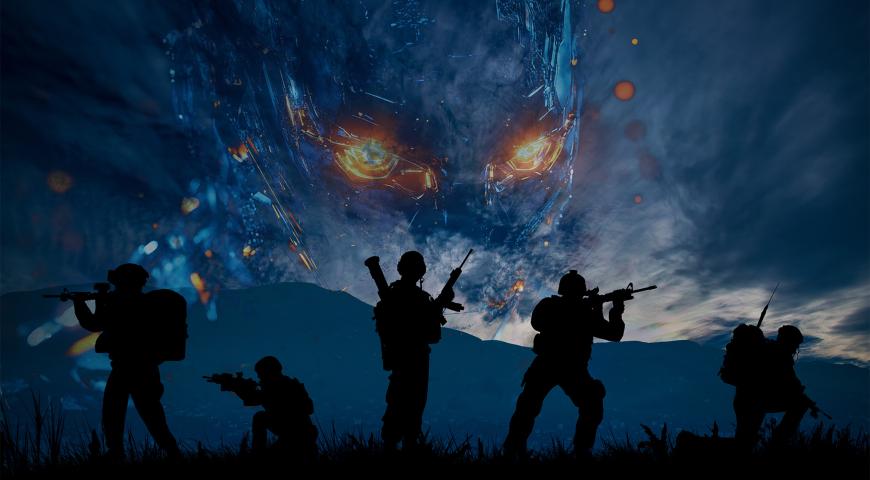The Principles of War are a set of guiding maxims instrumentally aimed at achieving victory as efficiently as possible. These have been repeatedly confirmed by personal experiences in war for over two-and-a-half millennia, and are largely immutable, despite dramatic changes in technology. Sun Tzu’s Art of War, Kautilya’s Arthasastra, Karl von Clausewitz’s On War, and Alfred Thayer Mahan’s The Influence of Seapower Upon History are the most well-known examinations. Intellectual knowledge of the principles of war is not enough, as directing an army often requires tough managerial talent, and historians as far back as Thucydides focus as much on the personality of the leader as the violation of these principles as explanations for defeat. These principles are generally agreed to be: the selection of a single aim, the concentration of force, maintaining the initiative, the economisation of force, information, leadership, and logistics. Some, such as the concentration of force and initiative, can be described using complex maths, and are often modelled in operations research. Russian President Vladimir Putin and his military leaders have neglected most of these principles for political expediency, at enormous cost to the prospects of victory and the survival of his regime.
The selection and maintenance of the aim, more specifically of a single unambiguous objective, is the keystone of successful military operations and the master principle of war, without which all other principles, and even overwhelmingly superior means, become irrelevant. US firepower could not sustain its war effort against the insurgents and their political message in either Vietnam or Afghanistan. Clausewitz clearly states that in selecting the aim of operations it is vital that there is enough capability. If there isn’t, then either the capability must be increased, or the aim reduced in scope such that it is attainable with the resources available. Selection of the aim at any level of war—the strategic, operational or tactical—is the first critical decision to be made by any commander. It is the aim that is the great object that brings a country into war, and which therefore provides the minimum conditions that must be achieved in order to secure political victory. Where the aim is clear, limited and achievable by the means on hand, as it was in Operation Desert Storm and even the Korean War, the desired outcome is more easily achieved than when the aim is over-ambitious, over-complicated, shifting over time, or where the resources are simply not available to bring about the desired outcome.
The selection of the war aim implies an integration of military and political decision making, the latter of which is the nexus for the management of resources, alliances and popular support. The compromise between political means and military ends influences the creation of the government’s war policy, which is the commitment to victory measured by the degree to which the population, economy and military will be mobilised, which in turn dictates what field commanders will have to work with. It can be argued that the ideology of the Republican Party in the 1850s allowed the United States to mobilise its entire population into industrial warfare, for the first time in its history, and win in the American Civil War.
Putin’s war against Ukraine is dysfunctionally political: he has prioritised his regime’s survival through coup-proofing, rather than sacrificing his power to achieve a battlefield outcome favourable to Russia, despite the two being closely linked. A direct result of coup-proofing is the shrinking of the number of cabinet members, as compared with democracies, which in turn short circuits the sharing of vital information from key departments such as foreign affairs, economic planning, and military strategy.
The twofold consequence of Putin’s shrinking of his cabinet is first, the marginalisation of the military’s institutional interest, evident in a growing number of dissident officers, and second, Putin has taken it upon himself the formulation of foreign policy and strategy. Putin’s penetration of the Russian armed forces has resulted in it becoming an earnest instrument of his will, but has also severely distorted its military planning, which manifests itself as a consistent violation of the ‘principles of war’. Putin’s state news apparatus has also allowed him to distort events in Ukraine in order to harness the innate nationalism of the Russian people. He does this by depicting the normal but dislocating process of Russian modernisation as a Western conspiratorial ‘wokism’ that poses an existential threat to Russian culture. His need to satisfy his Siloviki entourage, on whose coercive power he depends to remain in power, requires the diversion of scarce resources that would be better invested in technological innovation for the Russian economy.
A reasonable strategy for Russia would have been to make the political concessions to the under-40 urban population cohort, who will eventually be needed to fill his ranks before the conflict is over, and who generally disagree with NATO expansion. Also, de-gangsterising his intelligence networks, which are overly involved in racketeering, and incentivising industrial productivity—given that Russia’s manufacturing base has fallen behind South Korea and will soon be bypassed by Indonesia—are steps that his adversary, Ukraine, is much farther along. The Russian military is unsurprisingly concerned about NATO expansion into their sphere of influence, which will increase the costs of governing their multi-ethnic and religious state.
This brings us to strategy, which are the military and naval plans necessary to achieve the war aim. Strategy, like the aim, must be consistent with the means available. Putin’s war aims, though never expressed in a manner we might describe as being complete or honest, were either over-ambitious and unobtainable by the means available, or the strategy for achieving them was so flawed that the means were inadequate to achieve the key strategic goal. However, we can deduce from Russian military moves that he had two minimum objectives: first, seize control of all of Ukraine east of the Dnipro River and establish a land bridge to the Crimean peninsula, and two, capture Kyiv and Kharkiv and install a Moscow-friendly government. Here Clausewitz emphasises the destruction of the enemy’s military power—which he admits is not always possible in its entirety—the capture of territory to deprive the enemy of its human, materiel and economic resources, and the destruction of the enemy’s will to fight. The Kremlin failed to satisfy a minimum achievable effort against any of these three.
According to Clausewitz, Napoleon’s 1812 invasion of Russia had the flawed aim of occupying Moscow, based on a critical misreading of Russian defensive strategy. The problem was that Napoleon’s grand strategy depended on first destroying an enemy’s field armies in a decisive battle of annihilation—something at which he excelled—then getting what he wanted from a weakened adversary at the negotiating table. By 1812, even the Russians had figured this out and kept their army mostly intact simply by avoiding battle. Napoleon had already been defeated by a largely leaderless popular uprising in Spain. Similarly, even if Crimea and the Donetsk region are captured, by either Russia or Ukraine, there is no automatic war termination. By failing to link together the political and military aims, the Kremlin has illogically targeted Ukraine’s stalwart civilian population with bombardment, while Kyiv is correctly attriting the actual Russian Centre of Gravity, which is the casualty sensitivity of its younger cohorts in the army. Similarly to Russia, the US was unable to achieve its aims in the War of 1812 because it had muddled war aims, as the legislature had a wavering and slim majority in support of the war, and inadequate means. A risk-acceptance and unstable Japan war-clique struck Pearl Harbor in 1941 with insufficient means to knock the US out of the war, and inadequate submarine reach to influence even the costs of war. China faces a similar dilemma.
The risks of a diplomatically isolated Russia going to war against Ukraine do not appear to have been fully considered. Russia has historically fared poorly at war when diplomatically isolated, and particularly badly when going to war in Europe. The Crimean War is a textbook example. The main benefits of having allies in war is that they may share in some of the burden and sacrifice in war and lend popular credence to the notion that the war is justified. Russia’s allies in the current Crimean adventure, however, have made no significant contributions to the war effort, and if attacking Ukraine was intended to keep NATO at bay or send a warning to other states bordering both Russia and NATO, it has had the opposite effect, not only drawing NATO closer together than at any time since the end of the Cold War, but drawing in new members as well, like Finland and Sweden. Russian battlefield reverses, including the messy and bloody failures to capture either of Ukraine’s biggest cities, make it clear that the aim was overly ambitious for the force at hand, either in terms of numbers, or fighting capability, or both.
An extension of maintenance of a single aim is the unity of command and effort to achieve that aim. At all levels of war, employment of military forces in a manner that masses combat power toward a common objective requires unity of command and unity of effort. Unity of command means that all the forces are under one responsible commander with the requisite authority to direct all forces in pursuit of a unified purpose. Strangely, while Russia’s invasion started on 24 February, 2022, it was not until April that an overall Russian Commander, Aleksandr Vladimirovich Dvornikov, was appointed. Up until then, the war seems to have been managed from Moscow, although with Valery Gerasimov now in charge it seems the stabilised front has again attenuated battlefield control. There is nothing in principle contradictory with employing mercenaries, such as the Wagner PMC, as long as they don’t move to overthrow their political masters.
Another extension of the aim is simplicity, which is to prepare clear, uncomplicated plans and concise orders to ensure thorough understanding by the subordinates who will execute the operations. Clausewitz has a famous maxim: everything in war is very simple, but the simple things are difficult. He warns that friction, which is the intersection of confusion, fear of death, and the cumulation of small mishaps, can disrupt the best laid plans. Russia’s invasion was contingent on weak Ukrainian resistance, possibly further reduced by Russian sympathisers in Ukraine’s intelligence community. Had this been the case, an army consisting of troops with less than a year to perhaps slightly more than a year’s military training behind them might have been capable. However, overly ambitious goals and unexpectedly stiff Ukrainian resistance, bolstered in places by Western technology, seems to have created more friction than the Russian military could overcome. A close parallel was the German 1914 invasion schedule of the Schlieffen Plan, which was entirely dependent on the false assumption of light resistance of the Belgian Army.
The will to fight is dependent on the maintenance of morale, which is the positive state of mind derived from inspired political and military leadership, and a shared sense of purpose and values, well-being, perceptions of worth and group cohesion. Western doctrine stresses the maintenance of morale of one’s own troops, which are best articulated by British Field Marshal William Slim from his account of his fight against Japan in Defeat Into Victory.
Morale has three dimensions. The first, spiritual, highlights that there must be a moral object whose achievement is vital, that the methods of achievement must be active and aggressive, and the individual soldier must feel that their contribution has a critical impact on the outcome. The second, intellectual dimension, is that the goal is attainable and not out of reach for the soldier, that their organisation is efficient and worthy of their effort, and that whatever dangers and hardships they are called upon to suffer, their life is seen as valuable by their leaders. Third, materiel, where the soldier must believe they are being fairly treated, that there is an effort to provide them the best weapons possible, and that there must be an effort to provide for their living conditions. Russian, and by descent Soviet doctrine, seem to concern themselves entirely with the destruction of the enemy’s morale, which may help us understand why the Russians are giving such little attention to nurturing morale among their own troops.
The key to battlefield victory is achieving a concentration of force, specifically matching a military’s strongest force against an adversary’s weakness at the point of contact—typically achieved through deception, surprise, quick and synchronised manoeuvre—and sustained momentum (and denying the same to the enemy). The resulting inflicted exchange rate is expressed through Lanchester’s Square Law, which describes an inverse hyperbolic tangent in losses. What this means in a practical sense is that, as the ratio of forces increases, the resulting losses to the adversary grows exponentially. To achieve a concentration of force, often referred to as mass, requires offensive action. Many wars have been won by avoiding enemy concentrations of force, such as by Vietnamese light troops against France, the US and China, but they did so by understanding its effects. An ancillary principle is the economy of force, which demands the judicious exploitation of what are always the scarce resources of personnel, materiel and time in warfare. The Russian army never once either successfully manoeuvred the Ukrainians into a battle of attritional disadvantage as they failed in their nearly year-long effort at Bakhmut, nor encircled them.
Russian military doctrine stresses the seizing of the initiative at the earliest possible moment in war and never releasing it. As the invader, Moscow naturally had this initiative, but quickly lost it to the Ukrainians following the Russian failures and reverses at Kyiv and Kharkiv. Soviet doctrine recognises that mass and momentum has its own intrinsic power. Despite the superior training, organisation, leadership, and selectively better weaponry of the Germans during their invasion of the USSR during the Second World War, if the Soviet Army could break through at a weak point in the German defensive line, the speed of their advance would disproportionately dislocate and collapse their enemy. Soviet victories isolating Stalingrad in 1942 and their destruction of Germany’s Army Group Centre in 1944 were demonstrations of this insight. Current Russian equipment and organisation, its tank, infantry fighting vehicles, mobile artillery, helicopters, and special forces, are all designed for the conduct of Soviet-style high-tempo operations. However, the Putin entourage and Russian politicians, fearful of an army institution equipped with an independently minded leadership, has coup-proofed the military by selecting leaders based on loyalty rather than competence, crippling Russia’s ability to regain the initiative.
Though strict adherence to the Principles of War do not guarantee success, ignoring them completely at best leads to an unnecessarily costly victory, and at worst to failure and defeat. Conversely, the Ukrainian leadership has made a sober assessment of its political goals, which is to maintain independence while limiting unnecessary combat losses, and has therefore used its superior diplomatic strategy to enlist the support of Western materiel to support its tactics of attrition. Despite claims to the contrary by many journalists (Paywalled), Kyiv has the advantage of time, despite Russia’s five-fold advantage in population, since Putin has shown that he is worried mobilisation of Russia’s under-40 urban cohort could lead to revolution against his regime. Ukraine maintains a centralised operational level deployment, which is leveraging its advantage of the interior lines of communication to counter-concentrate against Russian assaults. While both Moscow and Kyiv are pursuing strategies of exhaustion without a clear script of how this will translate into war termination (without nuclear escalation), Kyiv has a critical advantage as the defender, has allies bound by common liberal values, and is not saddled with having simultaneously to support a burdensome kleptocracy.
Defence Mastery
Social Mastery
Please let us know if you have discovered an issue with the content on this page.
Comments
Start the conversation by sharing your thoughts! Please login to comment. If you don't yet have an account registration is quick and easy.




